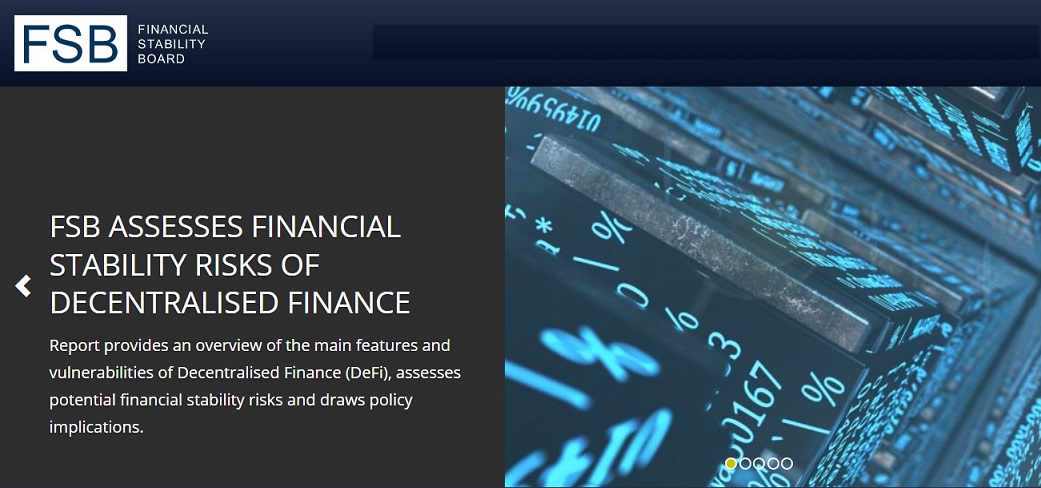Financial Stability Board assesses financial stability risks of decentralised finance

The Financial Stability Board (FSB) today published a report on the financial stability risks of Decentralised Finance (DeFi). DeFi is commonly used to describe services in crypto-asset markets that aim to replicate some functions of the traditional financial system in a supposedly decentralised manner – though the actual level of decentralisation varies widely.
The report, which was delivered to the February G20 Finance Ministers and Central Bank Governors meeting, concludes that while the processes to provide services are in many cases novel, „DeFi does not differ substantially from traditional finance in the functions it performs or the vulnerabilities to which it is exposed” – according to the press release.
DeFi’s specific features may result in some of these vulnerabilities – such as operational fragilities, liquidity and maturity mismatches, leverage and interconnectedness – playing out at times differently than in traditional finance. The fact that crypto-assets underpinning much of DeFi lack inherent value and are highly volatile magnifies the impact of these vulnerabilities when they materialise, as recent incidents demonstrate.
The extent to which these vulnerabilities can lead to financial stability concerns largely depends on the interlinkages and transmission channels between DeFi, traditional finance and the real economy. To date, these interlinkages are limited. However, if the DeFi ecosystem were to grow significantly, then the scope for spillovers would increase. The report identifies indicators that can be used to monitor DeFi vulnerabilities and transmission channels.
Based on these findings, the FSB will carry out additional work to:
. Analyse the growth and implications of the tokenisation of assets, i.e. the creation of a digital representation (token) of a financial instrument or real asset, as it could increase linkages between crypto-asset markets/DeFi, traditional finance and the real economy.
. Explore approaches to fill data gaps to measure and monitor interconnectedness of DeFi, in collaboration with standard-setting bodies (SSBs) and regulatory authorities.
. Examine the extent to which the FSB’s proposed policy recommendations for the international regulation of crypto-asset activities may need to be enhanced to acknowledge DeFi-specific risks and facilitate the application and enforcement of rules.
. Consider, in coordination with the SSBs, the regulatory perimeter across jurisdictions to determine which DeFi activities and entities fall or should fall within that perimeter. It also includes considering whether to subject such entities to additional prudential and investor protection requirements or to step up enforcement of existing requirements.
_______________
The Financial Stability Board (FSB) is an international body that monitors and makes recommendations about the global financial system. The FSB promotes international financial stability; it does so by coordinating national financial authorities and international standard-setting bodies as they work toward developing strong regulatory, supervisory and other financial sector policies. It fosters a level playing field by encouraging coherent implementation of these policies across sectors and jurisdictions.
The FSB is chaired by Klaas Knot, President of De Nederlandsche Bank. The FSB Secretariat is located in Basel, Switzerland, and hosted by the Bank for International Settlements.
The FSB was established in April 2009 as the successor to the Financial Stability Forum (FSF). At the Pittsburgh Summit, the Heads of State and Government of the G20 endorsed the FSB’s original Charter of 25 September 2009 which set out the FSB’s objectives and mandate, and organisational structure. The FSB has assumed a key role in promoting the reform of international financial regulation and supervision.
The FSB’s predecessor institution the FSF was founded in 1999 by the G7 Finance Ministers and Central Bank Governors following recommendations by Hans Tietmeyer, President of the Deutsche Bundesbank.
Dariusz Mazurkiewicz – CEO at BLIK Polish Payment Standard
Banking 4.0 – „how was the experience for you”
„To be honest I think that Sinaia, your conference, is much better then Davos.”
Many more interesting quotes in the video below:










